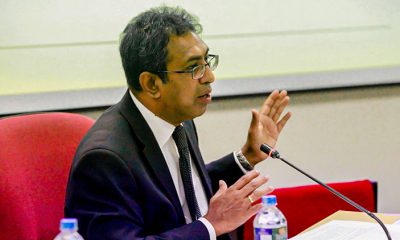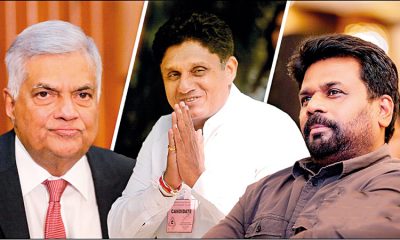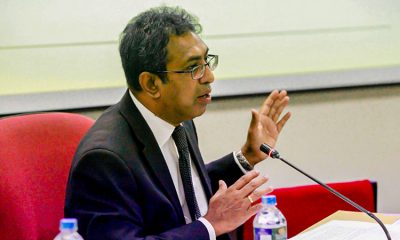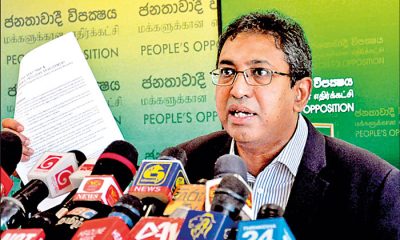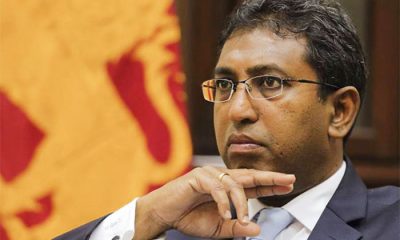News
Harsha finds many drawbacks in VAT system, ‘including lot of confusion even at highest echelons’

By Rathindra Kuruwita
There is a lot of confusion over the amendments to the Value Added Tax (VAT), and it will take a long time for the authorities to address the teething problems in the relevant software systems, Samagi Jana Balawegaya (SJB) MP, Harsha de Silva says.
Dr. de Silva pointed out that there was still a lot of confusion even at the highest echelons about the amendments to VAT. “Even the Colombo Tea Auction was suspended because they have no idea as to how VAT would affect their operations. We also need to ensure that the software at the IRD is ready. I think we will take some time to address technical issues that will arise,” Dr. De Silva said, noting that the amendment to the VAT regime was not that complicated. Goods and services that were taxed at 15 percent have been increased to 18 percent. Moreover, 97 items that were exempt from VAT previously were now subjected to VAT, he said.
“But people need to be better educated on how they should pay VAT. A company that has a turnover of over Rs 60 million a year must be registered for VAT. So, people might wonder if they have to pay VAT, if they buy a milk packet or an exercise book from a supermarket and whether they do not need to do so when they buy one from a roadside shop,” Dr. de Silva said.
“It is obvious that traders are taking advantage of this confusion,” he said, adding that traders were only acting as an agent for the government when they collected tax from the consumer.
“They can’t pocket the money so collected. They have to hand over that money to the state. There are also many issues in the efficiency in collecting taxes by government agencies. These loopholes will allow corrupt businesspeople to manipulate the VAT system,” he said.
The SJB MP added that Sri Lanka had a history of VAT frauds. Those between 2002 and 2004 had cost the Inland Revenue Department dear, he said.
“The government said that from 01 January 2024, everyone over 18 had to obtain a Tax Identification Number (TIN), which had to be produced when opening a bank current account, securing approval for a building plan, registering a motor vehicle or renewing a revenue licence, and registering land or a title to land by the buyer. The government informed us so in November. But this week the government has given a one-month grace period. So it’s obvious that the government has not done enough to ensure compliance,” Dr. de Silva said.
The coming year would be extremely difficult for the average Sri Lankan given the government’s target to double the revenue from VAT compared to the previous year, he said.
The government was planning to collect about Rs 1,400 billion from taxes in 2024, he said.In 2023, the government had sought to rake in about Rs 700 billion from VAT, Silva said.
“So, the government is planning to collect double that amount in the current year. It is obvious that the average Sri Lankan family would be severely affected by the enhanced VAT,” he said.
“Before 01 January 2024, the VAT was not imposed on diesel and petrol. The government has imposed an 18 percent VAT on them. These products were subjected to the Ports and Airports Development Levy (PAL) of 7.5 percent before, and this levy has been repealed. So, the actual increase in taxes due to the application of VAT to diesel and petrol is 10.5 percent.”
The SJB MPs said that there were Sri Lankan companies that produced software for Sri Lankan companies. Their products were now subjected to VAT. But if the software came from overseas it was not subjected to VAT, he said.
“This is a big problem. We must help the local companies. We, members of the Committee on Public Finance, tried our best to resolve this issue. Our proposal was that the government must not consider where the software originated from. We asked it to consider where the software was used. If the service is used in Sri Lanka, it should be subjected to VAT. The President then asked the Treasury Secretary to implement our proposal,” he said.
News
INS TARANGINI makes port call in Trincomalee

The Sail Training Ship of the Indian Navy, INS TARANGINI arrived at the Port of Trincomalee on a formal training visit on 27 Feb 26. The visiting ship was welcomed by the Sri Lanka Navy (SLN) in compliance with time-honoured naval traditions.
INS TARANGINI is a 54m long platform which is manned by a crew of 36 and is commanded by Commander Nitin Gajjar.
Meanwhile, Officer Under-trainees and Sea Cadets are expected to participate in sail training familiarization programmes aboard the ship and observe its operational functions during its stay in the island.
Furthermore, the ship’s crew is scheduled to take part in programmes organized by the Sri Lanka Navy to enhance camaraderie between the two navies, as well as visit several tourist attractions in the country.
News
Renewed Lanka’s Easter Bombing probe puts NTJ’s South India radicalisation network back under lens
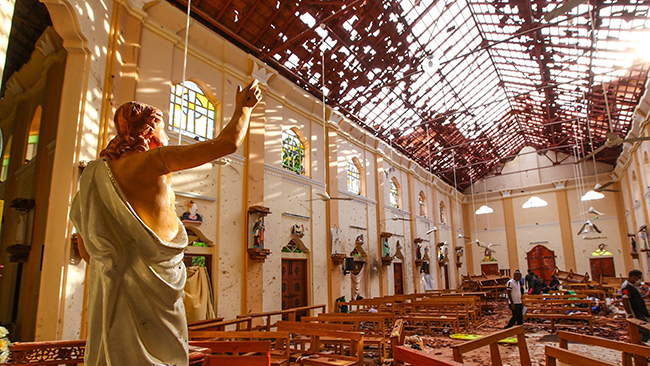
New Delhi (IANS):The arrest of Sri Lanka’s former Intelligence chief, Retired Major-General Suresh Sallay is a turning point in the investigations into the 2019 Easter Sunday bombings that killed 279 people.
The move was a bold one taken by President Anura Kumara Dissanayake who won the presidency in 2024.
He had promised that all persons involved in the attack would be brought to justice.
Sallay was made State Intelligence Service (SIS) chief in 2019 after Gotabaya Rajapaksa became President.
The allegation against Sallay was that he had permitted the attack to take place with the intention of influencing that year’s presidential election, which was eventually won by Rajapaksa.
Sallay had become a prominent figure in Sri Lanka and was widely credited with dismantling the LTTE. His arrest has led to a political storm and many state that it could revive tensions relating to the LTTE.
Ali Sabry, former Sri Lankan Minister for Foreign Affairs said that the developments are deeply troubling.
An Indian official said that the developments in Sri Lanka are being monitored closely.
On the question whether the LTTE issue would come back into the picture following the arrest of Sallay, the officer said that attempts are being made, but it would be very tough.
There have been several cases that the National Investigation Agency (NIA) has been probing concerning the revival of the LTTE.
The ISI, too, has tried its hand in ensuring the revival of the LTTE, but has not been successful so far.
To prevent the revival of the LTTE, both India and Sri Lanka have been working very closely.
Another official explained that the current ties with Sri Lanka have gone from ideological to an investment-led partnership.
Prime Minister Narendra Modi and President Dissanayake share a pragmatic relationship and this has gone a long way in ensuring cooperation on all fields including security, the official explained.
While some in Sri Lanka do not subscribe to Dissanayake’s decision on Sallay, the fact is that the Easter Bombing case has to be probed from every possible angle.
An Intelligence Bureau official says that a major concern today are the activities of the National Thowheeth Jama’ath (NTJ) and Jamathei Millathu Ibrahim (JMI), the two outfits responsible for this attack.
The NTJ in particular has a vast presence in South India and has managed to radicalise a large number of youth in Tamil Nadu and Kerala.
The mastermind of the attack, Mohammad Zahran Hashim was a frequent visitor to Tamil Nadu. He was also responsible for the radicalisation of Jamesha Mubeen who carried out an unsuccessful attempt to bomb a temple in Coimbatore in 2022.
The Indian agencies have been actively pursuing the role played by Hashim. A probe by the NIA in the South India radicalisation case revealed that the entire plot was being run by Hashim from Sri Lanka.
At least 50 of the 100 radicalisation videos seized by the agency were discourses by Hashim, who had close links with the Islamic State.
Officials say that Sallay could provide details to investigators about the module that Hashim ran.
This would come in handy for the Indian agencies who are probing cases directly linked to the NTJ in South India.
Hashim, who was the ring leader for the suicide bombers during the Easter Bombing had spent a considerable amount of time in India.
The Indian agencies would want to learn if any of the locals that Hashim interacted with had any idea about the Easter Bombings.
While in India, Hashim had focussed his radicalisation programmes mainly at Mallapuram, Coimbatore, Nagapattinam, Kanyakumari, Ramnathpuram, Vellore, Trichy and Thirunelveli, the NIA probe found.
Pallay has for now denied any links to the Easter Bombings.
Indian officials say that they do not want to comment on Pallay and his alleged links.However, it is important that the bombings are probed thoroughly since the activities of the NTJ have a direct bearing on India, particularly the southern states, the official also added.
News
Sajith warns: Don’t let trade union action stall cyclone relief
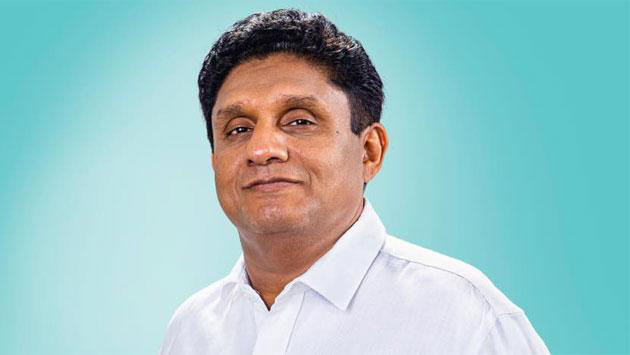
Opposition and SJB Leader Sajith Premadasa on Friday stressed that relief efforts for communities affected by Cyclone Ditwah must not be derailed by internal disputes, as several trade unions announced plans to withdraw from disaster relief duties.
Taking to ‘X’, Premadasa called on the Government to prioritise coordination and ensure uninterrupted assistance to families still awaiting aid.
“The Government must work closely with officers on the ground to ensure coordination and uninterrupted support. When families are still waiting, how can we allow for this confusion?” he questioned, emphasising that relief measures should not be delayed under any circumstances.
His remarks follow the decision by several trade unions representing Government officers engaged in disaster relief operations to launch trade union action beginning from Friday (27 February).
The unions announced their withdrawal from relief-related duties, citing unresolved issues affecting officers involved in post-disaster operations.
According to the unions, more than 93 days have elapsed since the widespread destruction caused by Cyclone Ditwah. During this period, disaster relief officers and Grama Niladharis have worked continuously, day and night, acting as key coordinators between the Government and affected communities. However, they claim that authorities have failed to adequately address longstanding concerns relating to officers engaged in relief work.
Meanwhile, Secretary to the President Nandika Sanath Kumanayake yesterday underscored the need to expedite relief and recovery initiatives.
Chairing a progress review meeting of the National Council for Disaster Management, he called for strengthened coordination among State institutions responsible for disaster response, noting that effective inter-agency collaboration is critical to delivering timely assistance to affected communities.
Efforts to accelerate recovery and maintain continuity in relief operations are ongoing.
-

 Features7 days ago
Features7 days agoLOVEABLE BUT LETHAL: When four-legged stars remind us of a silent killer
-

 Business7 days ago
Business7 days agoBathiya & Santhush make a strategic bet on Colombo
-

 Business7 days ago
Business7 days agoSeeing is believing – the silent scale behind SriLankan’s ground operation
-

 Features7 days ago
Features7 days agoProtection of Occupants Bill: Good, Bad and Ugly
-
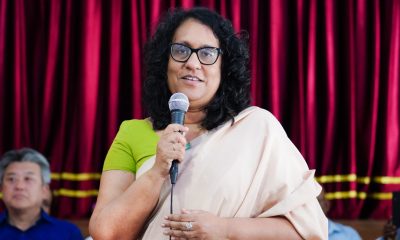
 News6 days ago
News6 days agoPrime Minister Attends the 40th Anniversary of the Sri Lanka Nippon Educational and Cultural Centre
-

 News7 days ago
News7 days agoCoal ash surge at N’cholai power plant raises fresh environmental concerns
-

 Business7 days ago
Business7 days agoHuawei unveils Top 10 Smart PV & ESS Trends for 2026
-

 Opinion3 days ago
Opinion3 days agoJamming and re-setting the world: What is the role of Donald Trump?


